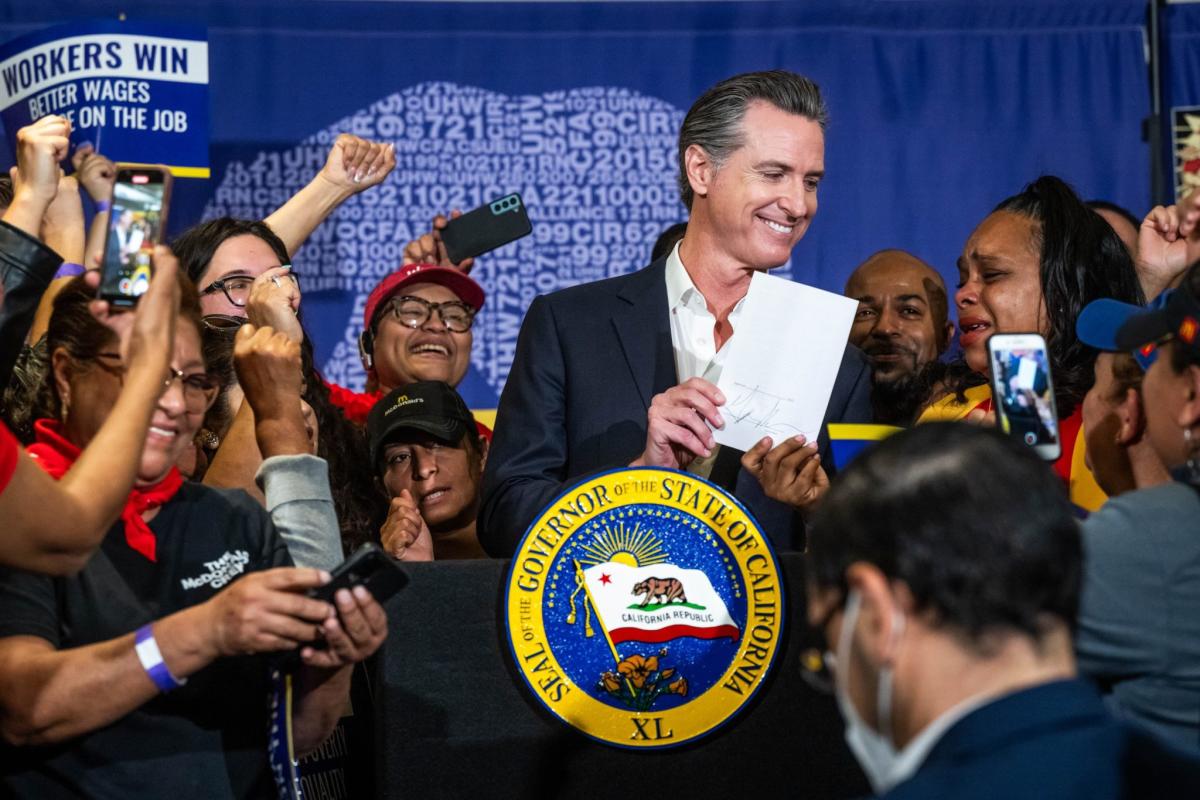
Over half a million fast-food workers in California are getting a hefty pay raise thanks to the state’s minimum-wage law that went into effect Monday.
California Gov. Gavin Newsom signed the minimum-wage legislation into law last September, increasing wages from the state wage of $16, a 25% bump. Assembly Bill 1228, which applies to franchises with over 60 locations, has an exception for bakeries. Its passage also formed the Fast Food Council, which will establish rules and regulations for the industry.
The effects of the minimum-wage mandate will ripple outward to small business owners. California already has the country’s highest unemployment rate—5.3%, compared to the national average of 3.9%—and slow job growth will exert pressure on other sectors to make their pay more competitive.
“I think we are going to see spillover effects within food service, but beyond that, we should expect to see spillover effects to other industries that are competing for this talent,” Daniel Zhao, lead economist for career site Glassdoor, told CNBC.
Though about half a million workers will rejoice at a pay raise, the mandate has raised concerns about increased operating costs that could impact hours for workers and the price of menu items. Some fast-food franchisees don’t believe California’s new law is worth celebrating.
‘We’re not a corporate store with deep pockets’
The California law’s passage means fast-food franchises will have to manage increased operating costs and strike a balance between raising prices and cutting workers.
Brian Hom, who owns two locations of Vitality Bowls in San Jose, said the minimum-wage mandate will cost him $100,000 across both of his stores. To offset wage increases, he’s increased store prices by 5%–10% and has stopped hiring new employees. Depending on the future of the business, he may consider cutting down shifts from three to four employees down to two—or, if things get bad, laying off workers.
“I'm all for increasing wages,” Hom said. “But I'm concerned with small businesses like myself being able to sustain keeping the business open.”
Hom said his stores are not corporate, and that he employs his wife, sons, and daughter-in-law. He added that many owners are people of color and immigrants who poured money into their franchises for their livelihood.
“I invested substantial money out of my retirement funds to open new businesses,” he said. “We're not a corporate store with deep pockets.”
Other franchises have made similar concessions. Pizza Hut laid off over 1,000 delivery drivers ahead of the law’s passage, but this was also due to industry change favoring transitions to third-party delivery services. Chipotle also intends to increase prices to offset increased operation costs.
"We know we have to take something as a significant increase when you talk about a 20%-ish increase in wages," Jack Hartung, Chipotle's chief financial and administrative officer, said in its fourth-quarter earnings presentation. “We haven't made a final decision, in terms of pricing. We'll wait and see just what the landscape looks like, what the consumer sentiment is, what other companies are going to do."
Laurie Schalow, Chipotle's chief corporate affairs officer, told Business Insider that Chipotle anticipates a mid-single-digit price increase after the law’s implementation.
‘They’ve already developed this buffer’
Alí Bustamante, deputy director of Worker Power and Economic Security at the Roosevelt Institute, isn’t convinced fast-food companies need to go through these concerted efforts to increase prices.
“California businesses can absorb this increase in the minimum wage without increasing prices and without having to impact employment in any kind of negative way,” he said in a Monday press conference.
Fast-food companies have been marking up prices for about a decade, Bustamante argued, and doing so at a much higher rate than other industries. A March Roosevelt Institute report found fast-food prices increased 46.8% from 2014 to 2023, compared to a 28.7% average overall price increase of goods. The report also found that in 2023, the 10 largest publicly traded fast-food companies spent $6.1 billion on share buyback to return money to investors. Roosevelt Institute calculated the cost to increase wages for all fast-food workers in the state would be, at a maximum, $4.6 billion.
The minimum-wage bump likely won’t be as dramatic as fast-food companies think: Minimum wage in some California cities is already higher than the state-mandated $16. The minimum wage in Los Angeles is $16.90 per hour; in San Francisco, it’s $18.07. This means many workers in those parts of the state won’t experience the 25% wage hike. According to the Institute for Research on Labor and Employment at the University of California at Berkeley, about one-third of minimum-wage jobs in California are already earning more than the state’s $16 per hour.
Not only will the law not impact fast-food companies to the full expected extent, Bustamante said, but fast-food companies are already adept at increasing profit margins, making it unnecessary for them to take additional measures to pass off increased operating costs to their employees.
“They’ve already developed this buffer,” Bustamante said. “They’ve already basically developed these unnecessary price hikes in the past that allow them to now either be able to actually absorb higher operating costs without actually necessitating increases in prices or impacting labor in any negative way.”
This story was originally featured on Fortune.com
Over 500,000 fast-food workers in California just got a huge raise thanks to a new law—but not everyone is celebrating - Yahoo Finance
Read More
No comments:
Post a Comment